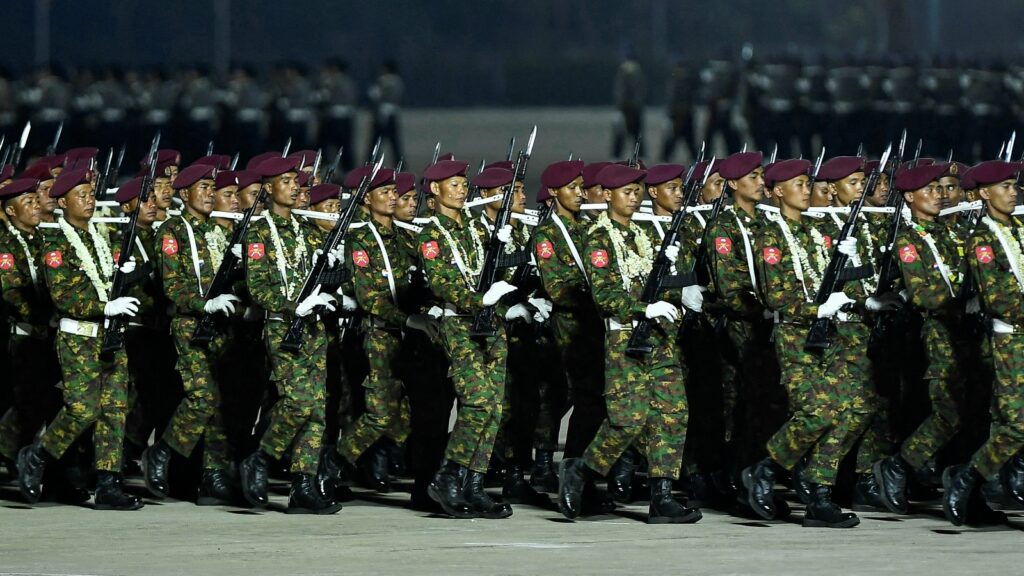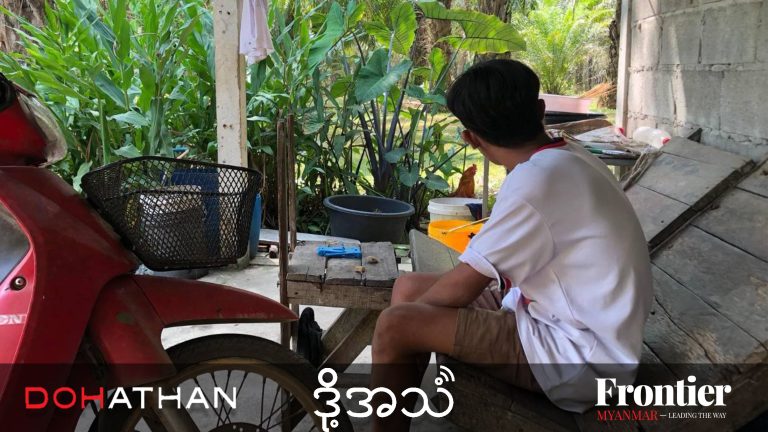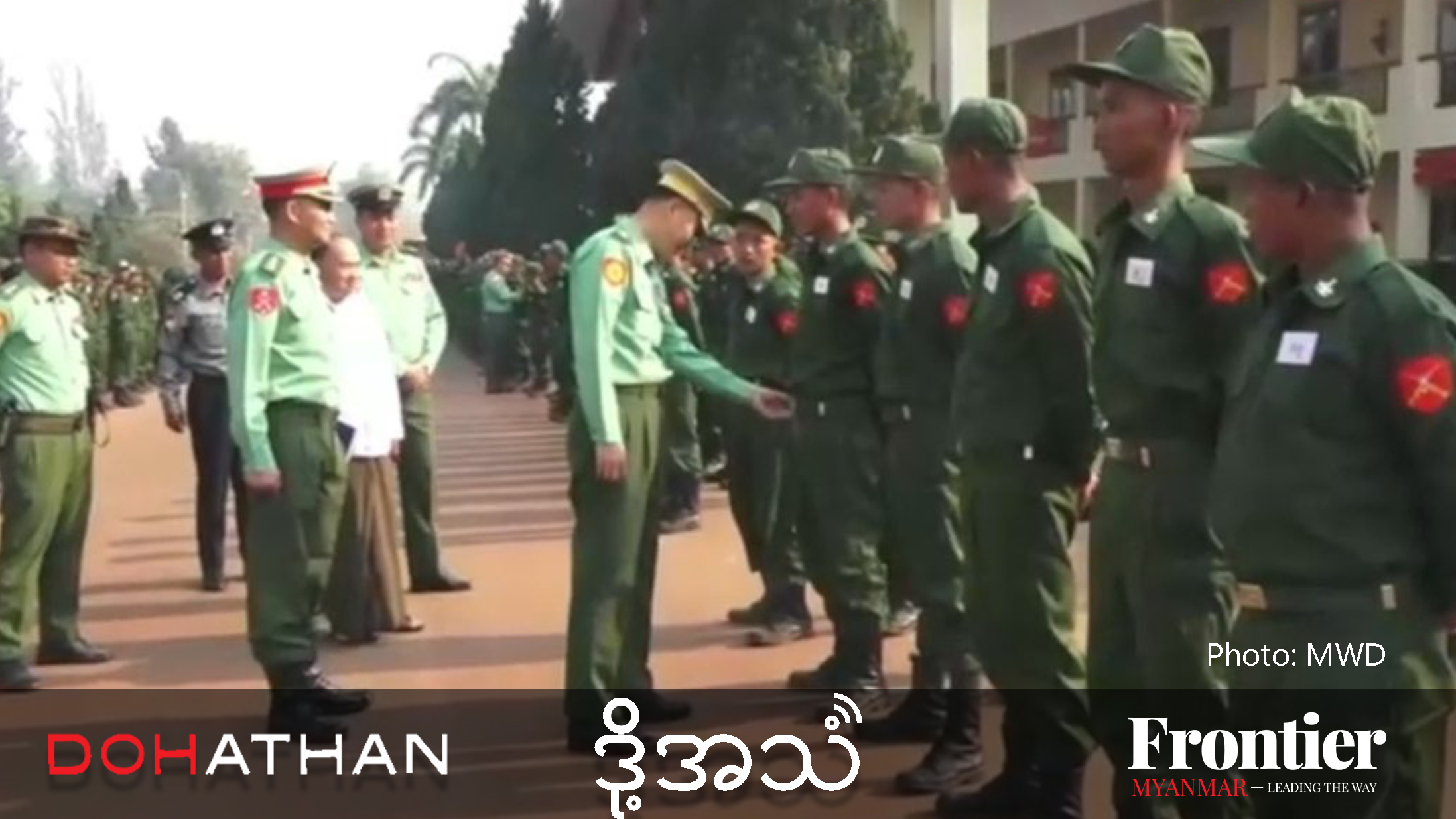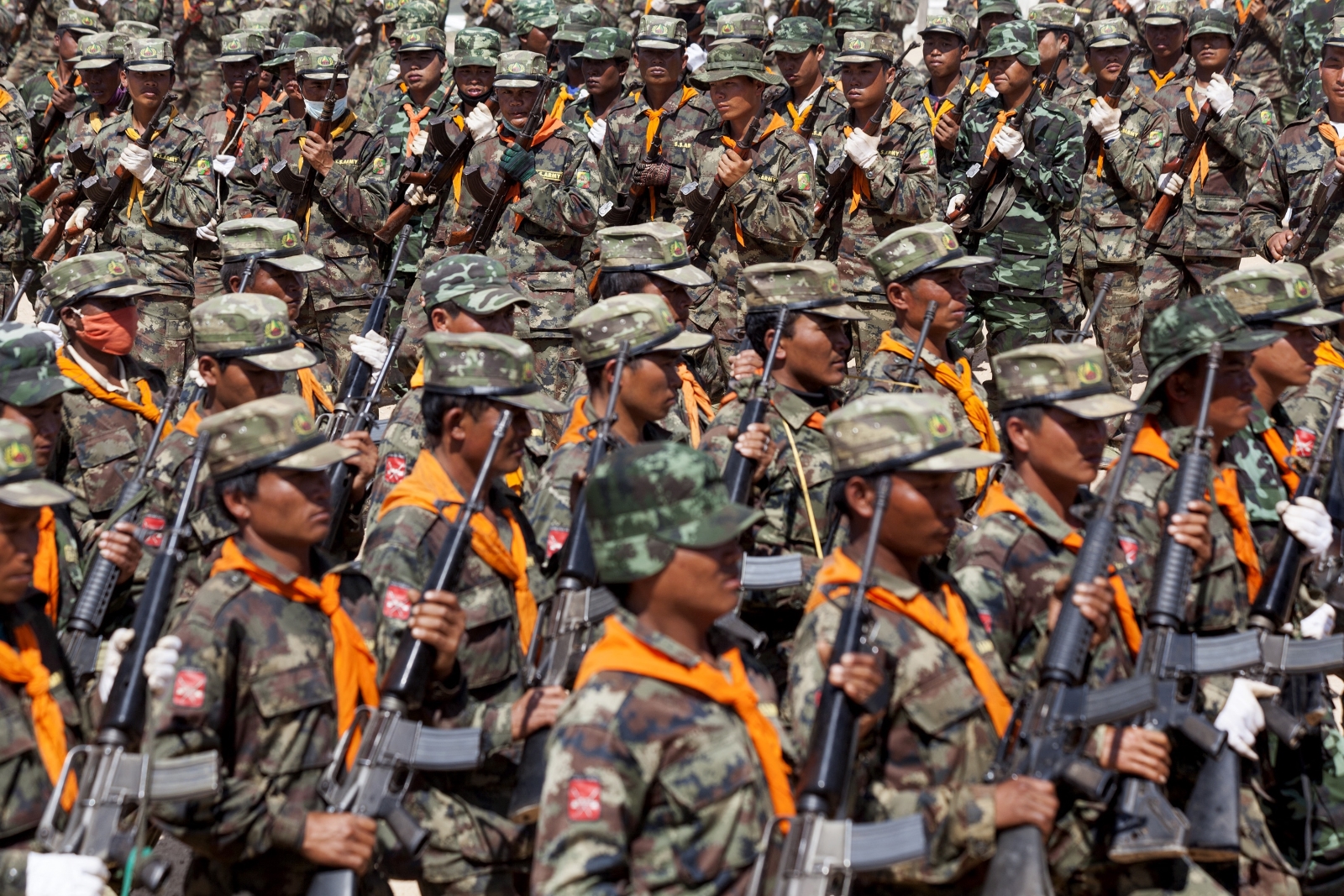The military’s conscription drive has provoked a reverse migration, pushing young men who fled Myanmar’s war-torn Dry Zone to give up their livelihoods and risk their lives to return home.
By FRONTIER
Maung Myo Zaw, 22, is struggling to learn Japanese online from his village in Magway Region’s Myaing Township, where the military regime has cut internet access. Gone are his dreams of leaving the country to work abroad.
“I’m learning online from home, but the internet connection is poor in my village, so it’s not going well. I doubt I’ll be able to make it to Japan. It’s really disheartening,” he said.
The February 2021 coup and subsequent armed conflict sparked a mass exodus from Myanmar’s central Dry Zone – which consists of parts of Magway, Sagaing and Mandalay regions – with many seeking education or employment in more stable areas of the country. But after the junta’s recent announcement that it plans to enforce a conscription law passed by the previous military regime in 2010, that tide is reversing.
Like thousands of other students, Myo Zaw joined a mass boycott of public schools and services in protest of the coup, abandoning his geography studies at Pakokku University, also in Magway. He fled the Dry Zone, which had become a hotbed of armed conflict, to enrol in a private Japanese language course in the relatively stable commercial capital Yangon, in the hope of going to work abroad.
But last month, his parents became so worried about the regime’s new military conscription policy, they asked him to return to his native village, despite the risks of war.
“I heard news about forced abductions in the city, but I’m not sure whether it’s true or not,” he said. “The ward administrator and other officials came to collect the list of people living at my hostel. They didn’t clearly explain the reason, just collected the information.”
Overstretched on the battlefield and facing armed resistance across the country, the military has turned to forced recruitment, saying it will draft 50,000-60,000 people per year in monthly batches, starting after the Thingyan holiday next week.
But despite the official timeline, the process has already begun, and has been rife with allegations of corruption and favoritism. There’s also been an increase in reports of young people being abducted and press-ganged into the military – already common in some areas even before the draft.
A teacher from a different Japanese-language class in Yangon’s Thingangyun Township said her school had over 200 students, but after the conscription drive was announced, the number decreased by one-third. She said, in particular, students from Sagaing and Magway regions have left.
These regions have become a stronghold of the People’s Defence Forces, pro-democracy armed groups loyal to the National Unity Government, a parallel administration appointed by elected lawmakers deposed in the coup.
“I assume travelling to and from class seemed a bit dangerous for them,” the teacher said.
Since the coup, individuals from resistance strongholds like Sagaing and Magway have faced discrimination in Yangon based on their personal identification cards. Many now fear being stopped at checkpoints in Yangon and forced into the military.
Fleeing the draft
Immediately after the regime announced its plan in February to enforce the 2010 conscription law, men of eligible age began seeking ways to escape military service. Some opted to flee abroad, while others headed to territory controlled by other armed groups.
News also spread on social media about abductions and forced recruiting, striking fear and panic into the hearts of many.
“I heard about forced abductions following the conscription law, and it felt too risky to stay,” said Ko Aung Ko*, a 28-year-old from Sagaing’s Khin-U Township who moved to Mandalay city to escape the war. There he found work at a water purification factory, earning a monthly salary of K250,000, about US$66 at the market rate, most of which he sent home.
But in February, he returned to Sagaing.
“I have no intention of joining their military,” he said. “Now I’m just working on my parents’ farm, so we lost my additional income. I didn’t want to leave my job, because it was really difficult to find, but I had no choice.”
According to the law, men aged 18-35 and women aged 18-27 can be called to serve in the armed forces, with a higher age limit for non-combat roles like doctors or engineers, although the regime has said it won’t draft women for now.
The conscription period is two years for regular citizens and up to three for professionals, but can be extended to five years in the event of a national emergency, which the military has imposed since it seized power in 2021. Avoiding conscription carries a penalty of three to five years in prison, while helping someone else evade military service can lead to a one-year prison sentence.

Bo Lin Yaung, an officer with the Khin-U Special Force Organization armed resistance group, under the NUG, said many young people moved to urban areas after the coup to find work and escape the war.
“But now, the military council is conducting checks at their workplaces and places where they stay, looking at guest lists or making arrests at night,” he said.
Registering young people in a given ward or village seems to be a common first step in the draft, before entering the names into a lottery.
A 30-year-old man from Pyinmana Township in Nay Pyi Taw said he and 10 other men in his ward drew lots on March 12. Luckily for him, his name was not drawn in the first batch.
“The officials said we need to draw again in August. If my name is drawn, I’ll flee to a safe place because I don’t want to serve in the military,” he said.
According to Data for Myanmar, the regime has begun collecting information, registering individuals and conducting lotteries in townships across the country. There’s been a higher rate reported in areas like Yangon, Bago, Ayeyarwady and Nay Pyi Taw, where the regime has more control.
“This fear has driven many to return home,” Lin Yaung said. “Forced abductions are also occurring to coerce them into military service. In our region, people returning from the city are doing whatever business they can manage. Some are working as daily wage labourers in farming. They are just trying to make ends meet so they can get by.”
Ma Aye Mu*, from Magway’s Yesagyo Township, came to Mandalay for work even before the coup, in 2019. She and her 26-year-old husband earned K300,000 each per month working in the quicklime industry
“The rules and regulations dictated by the military council are nonsense. They do as they please,” she said. “I told my husband to go back to our village. I can’t worry about him all the time. It’s safer for him there.”
He’s now working as a daily farm labourer, earning K4,000 for a half day’s work, when work is available. “Now his income is gone. He can’t get regular work in the village, he can only work if somebody asks him.”
Conflict and conscription awaits
Many are seeking safe haven in areas controlled by non-state armed groups, whether PDFs or ethnic armed groups in the border areas, many of which have fought for autonomy for decades.
U Win Htike, a village administrator under the NUG’s People’s Administration Team in Myaing Township, said the conscription law has had no impact on his village, which he asked not to name for security reasons.
“This is not a law recognised by our NUG government. The military council can’t enforce anything in our area regarding this law. None of the military council’s mechanisms can function here,” he said, adding that some young people returned to the village after the junta announced the conscription drive.
But while the regime may not be able to establish a functioning administration in these areas, it can still carry out punitive raids, which the outgunned PDFs are generally unable to repel.
“I’m not worried about this law because our village is run by the NUG,” said a 23-year-old man from Kun Taw village in Myaing Township. “But the military council’s troops do come here frequently. When they come, we have to flee to a safe place for a while.”
The NUG has declared that the public is not required to comply with the conscription law. Furthermore, they have announced that they will take serious action against anyone who helps implement the draft. A number of local regime administrators tasked with overseeing the process have already been assassinated, while some others have quit en masse to avoid a similar fate.
But in some resistance areas, a form of conscription awaits those who flee.
The Restoration Council of Shan State, which had granted safe refuge to many people who fled regime-controlled areas shortly after the coup, announced in February that it would draft anybody between 18-45 living in its territory, regardless of ethnicity.
In March, the Sagaing Federal Council (Preliminary) issued a statement saying anybody seeking refuge in its territory will need to stay at a designated location, and must be willing to participate in the revolution or in resistance-run public services for at least one year. The SFC was established at the Sagaing Forum in January, by a coalition of civil society and resistance groups independent of the NUG.
As of March 20, more than 80 people had reached out to them, according to Ko Yaung Ta Saung, a member of the SFC tasked with overseeing this process, about a third of whom are from Sagaing.
“We are doing our best to assist people who do not wish to serve in the military, rather than merely publishing statements against this law,” Yaung Ta Saung said. “Our efforts also aim to protect individuals from forced abduction by the military council. Most of the people who have reached out to us are from Yangon, Mandalay and Ayeyarwady.”
Both Myo Zaw and Aung Ko said this arrangement did not appeal to them, but they would accept it as a last resort.
“For now, I just want to continue my studies,” said Myo Zaw. “I don’t want to serve with them. From the beginning, I didn’t want to enter the revolution.”
“If ended up in a situation where I had to do mandatory military service under the junta, then I would contact them and go into a public service sector that I’m comfortable with,” he added.
Myo Zaw said the conscription drive is just the latest example of the military causing untold damage to the youth and society in general.
“Young people’s futures are being destroyed again because of this.”
*indicates the use of a pseudonym for security reasons







